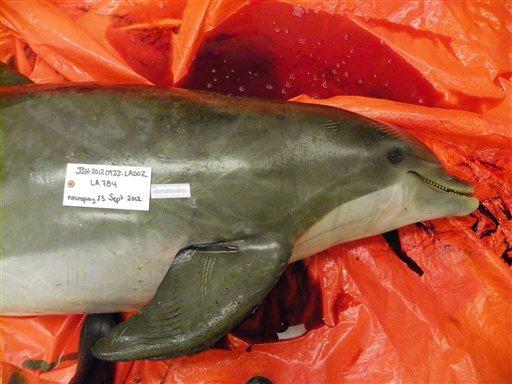NEW ORLEANS (AP) — Someone shot and killed a bottlenose dolphin found over the weekend on Elmer’s Island Wildlife Refuge, and there’s a $1,500 reward for information leading to a conviction, the National Oceanic and Atmospheric Administration said Tuesday.
The Whale and Dolphin Conservation Society is offering the reward, said NOAA Fisheries spokeswoman Kim Amendola.
The dolphin’s body was found Saturday on the state refuge just west of Grand Isle. It had been shot on the right side just behind its blowhole, and the bullet was found in its lung.
Mark Kinsey, enforcement supervisor for Texas, Louisiana and Mississippi, said it is the first dolphin shooting he has investigated in 12 years as an enforcement agent, but a dolphin was stabbed in the head with a screwdriver this summer.
The stabbed animal’s body was found June 22 near Dupont Point, Ala., and had been reported swimming in Perdido Bay near the Alabama-Florida state line for days before that, Amendola said. Investigators don’t have a single good lead in spite of a $3,500 reward from the Whale and Dolphin Conservation Society, Amendola said.
People can get close enough to stab a dolphin because feeding the marine mammals is all too common even though it’s been illegal since 1993, said Jeff Radonski, acting deputy special agent in charge of the Gulf, South Atlantic and Caribbean.
Other attacks on dolphins have been successfully prosecuted.
A Panama City, Fla., man was sentenced in 2009 to two years in prison and three on supervised probation for throwing pipe bombs at dolphins. The prison time was because he also was convicted of carrying a gun after being convicted of a felony, Amendola said.
Charter boat captains were convicted in 2006 and 2007 of shooting at dolphins: one because dolphins had grabbed his clients’ hooked fish; the second because a dolphin was approaching his boat.
“Their own clients turned them in,” Amendola said.
Tips can be left anonymously about unsolved cases such as the stabbing and the most recent shooting. Anyone with information is asked to call 1-800-853-1964.
The Marine Mammal Protection Act of 1972 forbids harassing, harming, killing or feeding wild dolphins. Violations can be prosecuted either civilly or criminally, with maximum penalties of a year in jail and $100,000 in fines.
A dolphin known as Beggar, which Amendola described as “our poster child” for problems caused when people feed and interfere with wild animals, was found dead Friday near Sarasota, Fla. The dolphin had stingray spines stuck in its body, but a necropsy also found evidence of human harm, however inadvertent: fishing hooks in one of its stomachs and healing propeller scars and broken ribs.
It can take years for dolphin-feeding citations to make their way through the system: three signed June 25 dealt with violations in 2009 and 2010 by tour boats and one in 2009 by two men apparently not associated with tour or fishing boats.
Copyright 2012 The Associated Press.





